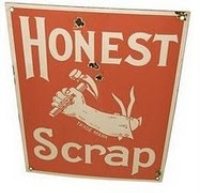Recently a conservative organization started a website called "Professor Watch List." Their website lists all the college professors that they claim are "radical" and whom they accuse of discriminating against conservative students. Notably, none of the professors they listed are "conservative."
Since I teach college students, I couldn't help checking to see if I was on the list. I wasn't, but I did recognize the name of a professor at another school where I used to teach. This professor is a feminist scholar, but the website included just one quote from an article that she wrote and made it seem as if she hated men and lied to her students about them. (She doesn't hate men, and she doesn't lie to her students either.)
I looked at the other professors that were listed on the website, and it was the same thing. That is, the website very briefly summarized the professors' research or included just one or two quotes from their work and distorted them just enough to make them seem "dangerous". It made my blood boil.
I wondered what they would write about me if I was listed on that site. Maybe it would be something like, "She's a neurotic workaholic who is always shrieking, 'I don't CARE how many likes you got on Instagram! Just put your phone DOWN!'" while she's teaching. Or maybe it would be, "She's un-American because she criticized Trump. She doesn't seem to realize that he's going to save the country." (By "save," do they mean "destroy"?) Maybe they'd claim that I should be fired for telling students that homosexuality is not a "choice" and that gay people are entitled to the same rights that everyone else is.
I also read an article about how the faculty at another college received calls from someone claiming to be a student at their school who was interested in enrolling in their class. They wanted to know which books were going to be on their curriculum. This wasn't an unusual question; I've received e-mails from students before each term who wanted me to send them my syllabus or a list of my required reading. But this person refused to identify themselves, and when the teachers probed further, the caller hung up. They later suspected that the person was trying to figure out if the teachers were "liberals" trying to "infect" impressionable students' minds with their "radical" ideas.
At other schools, students are demanding "trigger warnings" before studying anything that they're uncomfortable with and "safe spaces" to protect themselves from people who are racist, sexist, or disagree with anything that they say. At Oberlin College, students demanded that professors give them nothing less than C's (and definitely no F's) so that they could deal with their grief and anger over the police shootings of African Americans (Oberlin said no.).
On the one hand, I can understand the students' demands and where they're coming from. But I refuse to include trigger warnings in my syllabus, and I think that "safe spaces" will not help students learn how to deal with the real world, where there are no safe spaces. I think that the Professor Watch List will motivate many students to enroll in those professors' classes, because it will make them even more curious about them. I think that both conservatives and liberals are mistaken in their beliefs that only their own perspectives are correct, and everything said or done by the opposing side is completely wrong (although I know that not all conservatives and liberals are like this).
I also think it's wrong that professors and teachers have been fired for daring to disagree with students or disciplining them for their bad behavior. One high school teacher, Theo Olson, wrote a blog about gang activity at his school, where students assaulted teachers and each other. He was accused by "activists" of being racist and lost his job, but the problems that he described were not resolved.
I think it's important to teach students to develop multi-dimensional perspectives and to listen to people whose ideas do not match theirs, though they don't have to agree with them. I would encourage students to attend lectures and presentations given by people from opposing political parties, not so they can harass, attack, or prevent them from speaking (which has happened to many controversial speakers), but so they can learn how to form their own ideas in response to others'.
When I was a young, inexperienced teacher, I was easily intimidated. But years later, I refuse to back down to people who try to silence me, even if it means my name will one day end up on the Professor Watch List.
What about you? What do you think about things like this watch list? How would you react if you were a teacher and your name was on it?
Books Read Part 5
-
[image: B]ooks!
I still can't keep up with the books read list!
Here, then, is another slew of photos!
Three that didn't make it into the photos: Diary of...
3 days ago







